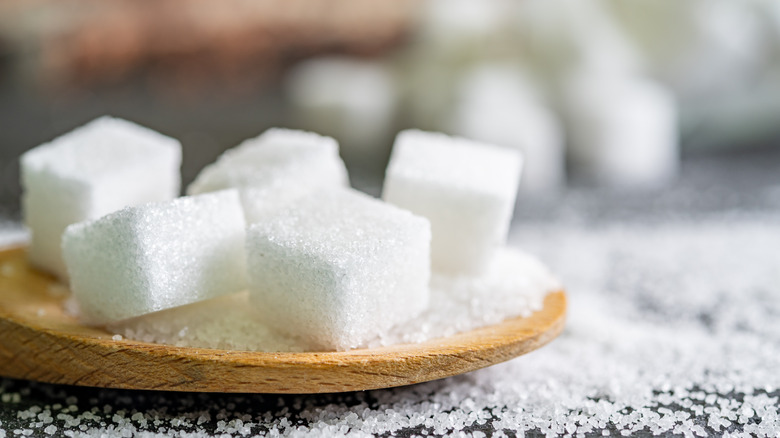Eating Artificial Sweeteners Every Day Will Do This To Your Body
Artificial sweeteners have become ubiquitous in the food and beverage industry. Touted by some as "the perfect food of the future," as they're intended to satisfy our desire for sweetness while containing zero calories, and without having the same rollercoaster effect on our glucose levels as actual sugar (via Saveur).
The very first artificial sweetener, saccharin (Latin for sugar), was accidentally created in 1878 by a Johns Hopkins University researcher, who was originally seeking new uses for coal tar derivatives (via Science History Institute). By 1906, saccharin had made its way into the recipes of various soda drinks and canned foods. It was later criticized for its potential toxicity but never subsequently banned. Many more faux sugars have hit the market since then, most of which are made from synthetic ingredients, though some are derived from natural sources like plants (via Time).
The use of fake sweeteners has been recommended by some professionals as a helpful adjunct for weight loss as well as for preventing dental caries and long-term diseases like diabetes. The consensus on them remains elusive, however. The Food and Drug Administration (FDA) continues to recognize them as safe, yet scientists are divided in their opinions about how their regular use might impact our health. Here are some ways that artificial sweeteners can affect your body and brain when consumed every day.
Digestive issues
Most artificial sweeteners are calorie-free, which means they're incompletely metabolized or aren't metabolized at all, since our bodies lack the digestive enzymes needed to break them down (via Scientific American). This may lead to a host of digestive and gastrointestinal woes.
The sugar alcohol type, in particular, like mannitol and xylitol, can have an "osmotic effect." In other words, they pull fluid into the digestive tract, which can cause bloating, gas, and diarrhea (via Livestrong). An upset stomach is often triggered by 50 grams or more of sweeteners but can also occur with as little as 10 grams. There's yet to be any conclusive evidence that the artificial sweetener type also causes stomach problems, per Livestrong.
Certain types of sweeteners, such as the sugar alcohol varieties like lactitol and sorbitol, may also have a laxative effect when eaten in large amounts, says a 2019 review study. For this reason, it's helpful for people with particularly sensitive stomachs to check the labels of items that tend to be sweetened like chewing gum and sugar-free candies.
What about your gut health?
It's hypothesized that one of the reasons why artificial sweeteners may cause digestive issues is that they disrupt the balance of good bacteria in your gut (via Frontiers for Young Minds). The microorganisms in your digestive system, known as gut microbiota, help break down the food that you eat, but they respond differently to different types of foods. Research has shown that the more that your gut bacteria are exposed to artificial sweeteners, the less they're able to properly process sugar. This has an effect on the body's capacity to absorb nutrients.
According to a 2014 study published in the journal Nature, consumption of artificial sweeteners can drive the development of glucose intolerance by altering your intestinal microbiota, leading to health issues like obesity and metabolic syndrome. The reduction in microbial diversity and stripping away of healthy bacteria, also known as dysbiosis, also underlies gut problems like celiac disease and irritable bowel syndrome (IBS), according to Healthline.
Those who consume sweeteners seem to have different profiles of gut bacteria than those who don't. But the effects of sweeteners on gut microbiota can vary widely between individuals. Needless to say, more scientific investigation is needed to clarify how artificial sweeteners affect our gut health, a 2015 study states.
Possible weight gain
Although artificial sweeteners have been used to aid weight loss, some researchers insist that they can actually have the opposite effect. A 2010 study published in the Yale Journal of Biology and Medicine argued that sweeteners can be counterproductive in the long term, giving rise to greater weight gain and increasing obesity.
Research indicates that our bodies and brains respond differently to artificial sweeteners than to sugar (via Frontiers for Young Minds). Sweeteners only partially activate reward pathways — part of what triggers the release of hormones and brain chemicals — which means they trick our brains into thinking we've had sugar while yielding less pleasure and satisfaction overall. As a result, people tend to overeat or opt for foods that have more calories in order to reach the same level of satiety they would if they'd had real sugar. Others may reason: "I'm drinking diet soda, so it's okay to have cake," David Ludwig, an obesity and weight-loss specialist, told Harvard Health Publishing.
Many studies have linked artificial sweeteners with weight gain. However, a 2014 meta-analysis concluded that sweeteners were associated with a slightly higher BMI — but not necessarily with increased body weight or fat mass. So, more research is needed around this theory.
Cravings may increase
Human beings naturally seek sweet-tasting foods (via Consumer Reports). Whether it's a creamy bar of chocolate or a sugary slice of cake, sweet foods help us self-soothe and celebrate. Our innate craving for sweetness, even when we don't need the energy, can be explained by the fact that our very first food, namely breast milk or formula, is sweet, Nicole Avena, an assistant professor of neuroscience, told Consumer Reports. And for our ancestors, sweetness signaled that a food item was safe to eat and high in calories, which was key for survival. Therefore, we tend to associate sweet flavors — whether in the form of refined sugar or fake sweeteners — with comfort and safety.
The allure for dieters is that artificial sweeteners contain zero calories. But these substitutes can range from somewhere between 180 times sweeter to as much as 13,000 times sweeter than real sugar, says research. Some experts argue that their intense and unnatural sweetness pumps up the appetite and sparks sugar dependence and cravings in much the same way as sugar; the more people have them, the more they want sweet things (via Healthline).
Additionally, some research has attributed this to the idea that our food and flavor preferences are trained with repeated exposure to certain foods. "Unsweetening the world's diet may be key to reversing the obesity epidemic", wrote the author of one 2010 study.
Changes to your taste buds
Artificial sweeteners replicate the flavor of sugar, and some products can be manufactured to taste much sweeter than the real deal (via Science History Institute). This has led researchers to speculate that frequent use of non-nutritive sweeteners might change the way people taste food and the types of foods they desire. In particular, they may desensitize our taste buds. People can start to find mildly sweet foods like fruit and vegetables flavorless or even unpalatable, which could lead them to shun natural and nutritious food items in favor of artificially-sweetened ones, according to Harvard Health Publishing.
"Non-nutritive sweeteners are far more potent than table sugar and high-fructose corn syrup," Dr. Ludwig explained to the publication. "A miniscule amount produces a sweet taste comparable to that of sugar, without comparable calories. Overstimulation of sugar receptors from frequent use of these hyper-intense sweeteners may limit tolerance for more complex tastes."
A 2017 study supported this hypothesis, demonstrating that saccharin and cyclamate, two of the oldest-known synthetic sweeteners, block some of our bitter taste receptors. A consequence is that it can suppress certain bitter tastes like alcoholic drinks, or even, slightly more disconcertingly, harmful chemicals (via Innovations Report).
Potential weight loss
Synthetic sweeteners have historically been marketed and used as a means to shed weight. A great deal of scientific evidence pinpoints them as a useful dietary tool, with many researchers suggesting that people who substitute fake sugars for real sugar can experience weight loss. To support this view, a 2012 study showed that replacing caloric beverages with lower or non-caloric alternatives was an effective weight-loss strategy, while a large 18-month study found the replacement of sugary drinks with artificially sweetened drinks significantly reduced weight gain and fat accumulation in normal-weight children.
If used appropriately, the fake stuff has the potential to facilitate weight maintenance, Richard Mattes, director of the Ingestive Behavior Research Center at Purdue University, explained to Consumer Reports. Artificial sweeteners fool our taste buds into thinking we've had sugar by providing the same yummy flavor and activating our feel-good responses but without the excess calories that cause us to gain weight. So, when consumed in moderation, they could temporarily satisfy a person's sweet tooth and allow them to consume less sugary foods overall, acting as a stepping stone towards a healthier diet.
Will artificial sweeteners raise or lower your diabetes risk?
Diet- and diabetic-friendly, fake sugars offer the pleasurable taste of table sugar without all the calories (via Diabetes.co.uk). A 2019 systematic review noted that the use of non-nutritive sweeteners in a generally healthy population can in fact improve fasting blood glucose levels, since your body doesn't produce insulin in response to consuming them. This was also demonstrated in a 2010 study that showed that artificial sweeteners didn't raise insulin levels.
But there's evidence that sweeteners can affect our blood sugar levels by changing our metabolism. A 2020 study of individuals with Type 2 diabetes revealed that artificial sweeteners led to higher levels of insulin resistance, demonstrating that the bodies of those who consumed them were less capable of digesting sugar. An earlier 2016 study also highlighted the connection between sweeteners and impaired glucose tolerance due to their impact on gut health, suggesting that long-term use of fake sugars may increase your risk of diabetes.
Blood sugar fluctuations
If you're having trouble managing your blood glucose, faux sweeteners may seem like the way to go. But some scientists warn that they can drive up your blood sugar levels even more so than sugary foods (via WebMD). This comes back down to your gut microbiota.
According to a 2014 rodent study published in the journal Nature, sweeteners precipitate the development of glucose intolerance and metabolic disease by altering the makeup and function of bacteria living inside your intestines. Researchers found that participants developed glucose intolerance just one week after consuming artificial sweeteners. It's believed that when the sweeteners were ingested, the bacteria released chemicals that caused an inflammatory response similar to a sugar overdose, changing the body's capacity to use sugar properly.
It's been established that synthetic sweeteners can also interfere with a person's metabolism (via Eating Well). When you consume sweet foods, your body responds by activating the metabolism and releasing certain hormones so as to regulate appetite and blood glucose. But when you have artificial sweeteners instead, the body doesn't receive any actual calories, so it doesn't stimulate the metabolism or release the necessary hormones it usually would. If caloric foods are then subsequently consumed, your body may not be equipped to metabolize and process these in the right way, which could result in higher blood glucose and weight gain in the long haul.
Changes in blood pressure
Research has shown that artificial sweeteners lower blood pressure in some people (via WebMD). In a 2009 study, for example, researchers looked at the effects of consuming oligofructose (OFS), which is used in various foods like ice cream, dairy products, and baked goods. They found that it led to a significant drop in blood pressure and improvement in lipid metabolism in participants with mild or borderline high blood pressure, also known as primary hypertension. The subjects also lost some weight throughout the study.
American Heart Association spokesperson Alice Lichtenstein told WebMD that while "the study is very interesting," additional researcher is needed "before we can make recommendations about whether people should take OFS supplements."
Interestingly, faux sweeteners could also cause blood pressure to shoot up, as highlighted by a 2017 systematic review. The trials didn't show a consistent effect of sugar substitutes on weight loss whereas the longer observational studies revealed a possible connection between using sweeteners and elevated risks of high blood pressure, diabetes, heart disease, and weight gain.
Improved oral health
Sucrose, also known as sugar, is often cited as one of the most cariogenic carbohydrates — this essentially means that it tops the list of substances most likely to initiate tooth decay and gum inflammation (via Colgate). The damage is caused by the acid that sugar produces, which, when combined with bacteria, saliva, and food in the mouth, create plaque, a sticky substance that breaks down tooth enamel and eventually yields cavities.
Even though artificial sweeteners are often far sweeter than sucrose, they don't have the same toxic effect on your teeth and generally don't contribute to tooth decay, as noted by a 2018 study. Conversely, it's suggested that artificial sweeteners have an anti-cariogenic effect — not only do they not contribute to acid formation but they may help prevent tooth decay. When you consume something containing sugar, the pH in your mouth drops due to the increased acidity, whereas faux sweeteners appear to balance out pH levels in your saliva, reducing the accumulation of decay-causing bacteria.
Emotional problems
Artificial sweeteners might not uplift our mood in quite the same way as they perk up our coffee. A 2014 study examined the link between synthetic sugars and depression. Findings revealed that the risk of depression soared for elderly people who frequently drank sweetened beverages, whereas the consumption of sugar-sweetened drinks didn't contribute to a low mood. The authors speculate that this could be attributed to the neurological effects of certain artificial sweeteners, such as aspartame — one of the most popular and widely used sweeteners available — which has been associated with various negative health consequences over the years (via Science History Institute).
Aspartame is made up of two amino acids: phenylalanine — which plays a part in neurotransmitter regulation — and aspartic acid — an excitatory neurotransmitter, according to another 2014 study. These amino acids are safe in small quantities. But excessive consumption of aspartame can result in a substantial increase in phenylalanine and aspartic acid, which in turn, may compromise serotonin and dopamine production. As Medical News Today explained, "People sometimes refer to dopamine and serotonin as the 'happy hormones' due to the roles they play in regulating mood and emotion."
Impaired cognitive function
According to a 2018 study in Nutritional Neuroscience, memory and learning problems are possible neurophysiological symptoms of aspartame. Additionally, the same 2014 study looking at the relationship between artificial sweeteners and depression also considered aspartame's effect on cognitive function, specifically, working memory and spatial orientation. Findings revealed that participants who consumed a high-aspartame diet performed worse on spatial orientation tests than those on a low-aspartame diet, but there were no observed differences in working memory between the two groups.
Other studies indicate that artificial sweeteners can impair hippocampal function by crossing the blood-brain barrier. This may interfere with body weight regulation by disrupting the higher-order learning and memory processes that play a role in controlling appetitive and consummatory behaviors.
A 2017 study highlights the possible role of artificial sweeteners in the risk of dementia and stroke. Researchers analyzed data collected from almost 3,000 adults. They found that people who consumed at least one artificially sweetened diet drink per day had more strokes and were more likely to develop dementia when compared to those who didn't consume diet drinks. The results were the same even when accounting for other contributing factors like diet, smoking, and exercise.
More migraines?
Some research has suggested that artificial sweeteners are migraine triggers, specifically aspartame and sucralose (also known as Splenda). One 2006 case study, for example, reported that sucralose was a constant cause for a female patient's migraines. A 2008 study underlined a possible connection between aspartame and migraines, particularly among children and adolescents. It's believed that aspartame gives rise to migraines by breaking down and being converted into formaldehyde when ingested, which is a common chemical that's known to provoke headaches, explained the study authors.
Both the American Migraine Foundation and the Mayo Clinic also cite artificial sweeteners, namely aspartame, as a possible cause for migraines. It's important to note, however, that the relationship between sweeteners and headaches or migraines has been subject to debate, with some researchers conceding that there isn't enough conclusive evidence, since most studies around this are anecdotal. Still if you frequently consume artificial sweeteners and have been experiencing migraines, it's worth bringing up with your doctor.













